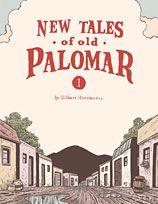- Comics
- Comics Reviews
- Manga
- Comics Reviews
- European Comics
- News
- Comics News
- Press Releases
- Columns
- Spotlight
- Digital Comics
- Webcomics
- Cult Favorite
- Back Issues
- Webcomics
- Movies
- Toys
- Store
- More
- About
By Leroy Douresseaux
January 17, 2007 - 10:38
 |
New Tales of Old Palomar #1 by Gilbert Hernandez (Love and Rockets, Sloth) is the 14th book in the Ignatz series. Ignatz is a line of comic books co-published by Fantagraphics Books (Seattle, Washington) and Italy's Coconino Press. With an international roster of cartoonists and creators, each individual Ignatz comic book is printed on heavy paper with cardstock covers in an oversized two-color format. Ignatz titles are part book, part magazine, part comic book (pamphlet), and part serialized graphic novel, and like a book, each edition in the line has a dust jacket. The oversized publishing format makes this look like a magazine, but the contents are all comic book.
New Tales of Old Palomar begins sometime after the first Heartbreak Soup story. If I'm correct that would be the two-part, "Sopa de Gran Pena," published in Love and Rockets #3 and #4 (1983) and first reprinted in the 1986 collection Love and Rockets Book Two, which was re-titled Chelo's Burden in future editions. New Tales of Palomar will be told over three issues and feature classic Palomar characters like Luba, Chelo, and Pipo.
In this issue's tale, "The Children of Palomar," the citizens of Palomar, a small south of the border town, form an ensemble cast. No one character stands out, and the townsfolk help one another. The first story does tend to focus on the attractive and athletic teenager, Pipo, and her tomboyish sister, Carmen. Sheriff Chelo and the rest of the townsfolk are trying to discover the identity of the thieves who are stealing food wherever they can grab it and taking off like lightening. It's up to Pipo and her soccer-trained legs to catch the thieves and then save their lives.
Some critics have stated that Gilbert Hernandez's comix, especially his work published in and related to Love and Rockets, are best read in their original short form rather than in collected or book editions. The longer one reads Hernandez's short stories, the more obvious it becomes that most of them are connected. Hernandez moves through the past, present, and future, but he presents the stories as a mosaic rather than as a seamlessly flowing narrative moving directly from past to present. Reading collected Gilbert is so much fun because it allows the reader to put the pieces together so that, at least in the reader's mind, all of Gilbert's comix appear as one linear narrative.
That said: I enjoy getting stories that hop around his universe, so I prefer his work as short pieces rather than as graphic novels. When he takes us back to the past, Gilbert enriches the present stories. For long time readers, New Tales of Old Palomar is a love letter tucked inside a time machine. For new readers, this is a chance to go back to the motherland of Palomar before venturing out into the wonderful world of Gilbert.